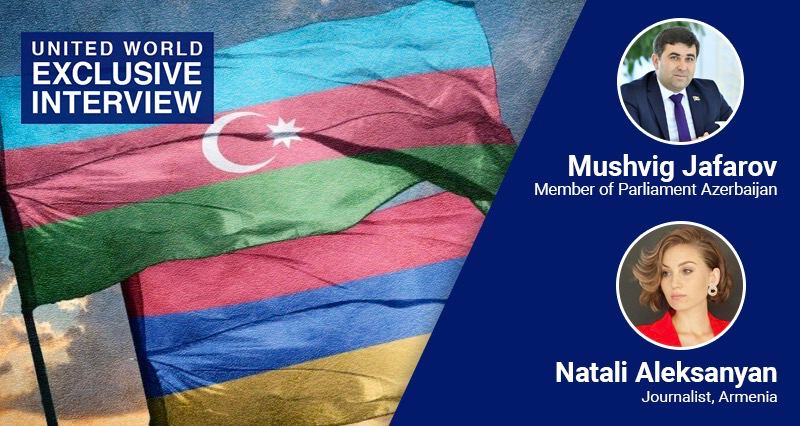The Azerbaijani MP warns against foreign meddling, while the Armenian journalist expresses optimism for reconciliation.
The Azerbaijani MP warns against foreign meddling, while the Armenian journalist expresses optimism for reconciliation.
By Tehran Tapdigov, Baku / Azerbaijan
The new realities created by the Second Karabakh War have also prompted countries to consider peace. After the conflict between Azerbaijan and Armenia ended, the two countries began working towards peace.
However, certain powers that do not want peace to be established between Baku and Yerevan continue to create obstacles to normalizing these relations. This is clearly seen in the arming of Armenia by France and India, as well as the European Union mission allegedly conducting intelligence operations against neighboring countries within Armenia’s territory.
For these reasons, the current discourse seems to be more about war than peace. Armenian Prime Minister Nikol Pashinyan has indicated that his country might undergo constitutional amendments in 2027, which implies that the signing of a peace agreement between Azerbaijan and Armenia could be postponed for another three years.
This is because the Armenian constitution contains territorial claims against Azerbaijan. As long as these claims remain in the constitution, any peace cannot be considered a full and complete peace.
At the same time, Armenia’s gathering of military units at the Azerbaijani border is seen as a harbinger of a new war.
Comments from Azerbaijani MP Mushvig Jafarov and Armenian journalist Natali Aleksanyan, who have different views on the matter, also highlight the ongoing tension.
Jafarov: “Other powers are at play” on the border
Mushvig Jafarov believes that Armenia is preparing for a new war and is not genuinely interested in peace.
“It is important to note that Armenia has failed to comply with its post-war commitments regarding the procurement of weapons. For instance, it has signed a contract for the supply of arms from India. We know that India is providing Armenia with approximately $250 million worth of weapons. However, this does not align with the country’s economic and financial situation. The policy of occupation has brought no benefit to Armenia; on the contrary, it has been excluded from all regional projects. Armenia has turned into a dead-end country. Currently, the number of major industrial enterprises belonging to Armenia is very limited, and even the management of strategic infrastructure facilities has been entrusted to foreign companies or sold to them to cover budget deficits.”
Azerbaijani MP Jafarov believes that if Armenia does not abandon its war rhetoric, Azerbaijan will respond seriously.
“These days, there is a sharp increase in the budget deficit. It is not convincing that Armenia, whose economy is in such poor condition, is gathering large-caliber, expensive weapons at the Azerbaijani border. It is clear that other powers are at play here. But in any case, Azerbaijan will not surrender to the plans of Armenia and its supporters. It will take all necessary response measures.”
Aleksanyan: “Joint work of state commissions will yield positive results”
Natali Aleksanyan, on the other hand, has a different perspective. Aleksanyan believes that serious efforts are being made to establish peace between Azerbaijan and Armenia.
“Yes, steps are being taken to establish peace between Armenia and Azerbaijan. This week, the border commissions of Armenia and Azerbaijan have completed their work on coordinating joint activities and have begun implementing domestic procedures. This is a very important step towards establishing peace between the two countries. However, the most important condition is the desire, and Armenia has the willingness to build peaceful relations with Azerbaijan. I have no doubt that Azerbaijan also has peaceful intentions. I hope that the joint work of the state commissions will yield another positive result, and from then on, actions will proceed according to proven internal state mechanisms.”
Disagreeing with the idea that the EU mission in Armenia gathers intelligence against neighboring countries, Aleksanyan asserts that the mission contributes to peace.
“The statement by the Russian ambassador is actually a failed attempt to pit Western Europe against others. It aims to arm Armenia’s regional neighbors—Azerbaijan and Iran—against the Collective West. In reality, the EU mission is conducting an observation mission, thereby contributing to the establishment of peace in the region. At the very least, it does not interfere with this process. This is actually a fake thesis intentionally thrown out by the Armenian Dashnak opposition, seized by Azerbaijani expert circles, and then interpreted as Yerevan’s official position. Therefore, it should be noted that Armenia is peace-oriented and does not strive for escalation.”
Believing that Armenia’s armament is for self-defense, Aleksanyan expressed optimism about the absence of war.
“The most dramatic events occurred precisely in September. I truly hope that this September will pass peacefully, and that peace will follow. At the very least, Armenia has no desire or intention to invade Azerbaijan. Therefore, I have little notion of how this war would occur. Let’s hope that this deadly chain of Septembers will come to an end.”
















Leave a Reply